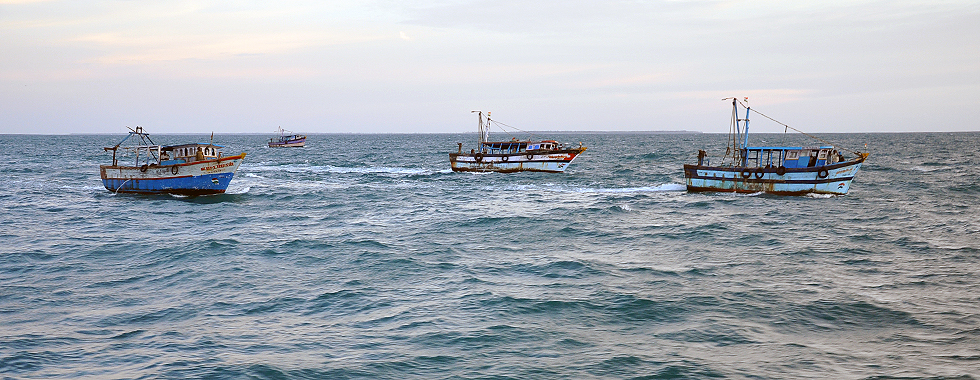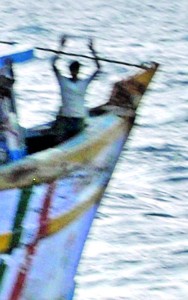Sunday Times 2
Indo-Lanka fishing puzzle: Putting the pieces together
Last week’s decision by the Minister of Fisheries to continue ‘fishermen to fishermen dialogues’ in search of a solution to the fishery dispute in the Palk Bay, comes at an interesting time. Since the middle of April, south Indian trawlers have been absent from the Sri Lankan side of Palk Bay, because of the Indian Central Government’s annual ‘monsoon fishing ban’. The nationwide ban on fishing by mechanised fishing vessels in India lasts between 45 and 60 days and is intended to conserve Indian fish stocks.
For the past three weeks 50,000 or so Sri Lankan fishermen from Kalpitiya in the northwest to Vadamarachchi in the northeast, have had the opportunity to fish freely throughout the week. The impact of no illegal trawling by south Indian fishermen is not just being felt by fishermen. In Jaffna, one of Sri Lanka’s leading seafood companies, Taprobane Seafood (Pvt) Ltd, is running at full capacity, employing more than 350 staff, 90 per cent of them women, to clean, pick, pack and pasteurise crab meat.

Indian boats in Sri Lankan waters: Arresting the fishermen or detaining them has not stopped the poaching
According Taprobane’s Regional Operations Manager Thusithen, the volume of crabs purchased by Taprobane increased significantly last month. This has enabled the company to employ more staff and allow its staff to work longer shifts. He said Taprobane remitted more than Rs. 1.25 million in wages to employees at its Jaffna factory alone in April and a colossal Rs. 3.6 million to workers across the Northern Province. More crab = more employment = more incomes for families in the north: due to the absence of Indian trawlers from Sri Lanka’s northern waters.
The ‘monsoon ban’ on fishing by mechanised trawlers in Tamil Nadu ends on May30. The key question fishing communities, seafood companies and workers in the north are now asking is: “Will the Indian trawlers return on June 1 and if so, on whose terms”?
The resumption — or not — of illegal fishing by Indian trawlers in Sri Lanka’s northern waters and on what conditions are two of the points that need to be discussed by fishermen’s representatives when they meet in Colombo tomorrow. Before this debate begins, however, the south Indian trawler owners will have to convince Sri Lanka’s northern fishermen of the worth of any further discussions.

An Indian fisherman puts his hands up as a Sri Lanka Navy boat (not in the picture) approaches (the Sunday Times file pic)
When the two groups met in Chennai this year, they agreed as gesture of ‘goodwill’ that Indian trawlers would stop fishing in Sri Lankan waters for a month from February 10. Despite the talks and the gesture of ‘goodwill’, the violations continued. Eighteen Indian trawlers and over 90 Indian trawler fishermen were arrested by the Sri Lanka Navy during the month long self-imposed ban.
A key task for fishermen’s representatives will be to reach an agreement on the ‘endpoint’: the situation or state all other parties need to work towards. The other key task will be to work out the route by which to get there. Northern fishermen’s organisations have already stated their desired ‘endpoint’ in each of the three preceding ‘fishermen to fishermen’ dialogues. They simply want an end to fishing by Indian trawlers on the Sri Lankan side of the bilaterally agreed International Maritime Boundary Line (IMBL) in the Gulf of Mannar, the Palk Bay and the Bay of Bengal.
This ‘endpoint’ is in no way dissimilar to the situation prevailing in the north today where 50,000 Sri Lankan fishermen are free to fish throughout the week; where seafood companies are running at full capacity, creating employment incomes for households and where the Northern Province again is a major contributor to Sri Lanka’s national fish production.
Representatives of south Indian trawler owners appear to have accepted or at least are resigned to northern Sri Lankan fishermen’s demand for an end to illegal fishing in Sri Lankan waters. In 2004, the time frame agreed by both parties for a full withdrawal was three months. In 2010 a phased withdrawal was planned over 12 months. In January of this year Sri Lanka’s representatives demanded an immediate end to illegal fishing. South Indian trawler owners offered a temporary one month ban. In the end Indian trawlers continued to fish in Sri Lankan waters until the annual monsoon fishing ban imposed by the Tamil Nadu State Government.
As I said above, the route to the ‘endpoint’ is crucial. An immediate end to illegal fishing by south Indian trawlers in Sri Lankan waters is probably not realistic. But is another year too long for Sri Lankan fishermen to wait for the right to fish freely in Sri Lankan waters? A phased withdrawal, such as was proposed in 2010 looks the most reasonable. If the ‘endpoint’ and the route can be agreed tomorrow, then the fishermen’s leaders’ job is done.
To be viable the ‘endpoint’ and the route agreed between fishermen’s leaders must have the backing of the governments in Sri Lanka and India. Fisheries officials from Chennai and Colombo will be attending tomorrow’s meeting as observers. One would hope as they are acting as advisers too, to their respective representatives. The outcome of tomorrow’s discussions should already have been tacitly approved by the officials.
At this point in the proceedings, fishermen’s representatives can take a backseat, while state and central government authorities take on the responsibility for navigating the agreed route to no further illegal fishing by Indian trawlers in Sri Lankan waters. In Tamil Nadu the department of fisheries needs to review its coastal fishery management policy. The review should identify the maximum trawler fishing capacity is consistent with the sustainable exploitation of marine resources in the state’s waters and India’s exclusive economic zone beyond. The Chief Minister then needs to request an emergency package of assistance from the newly elected Indian government, to finance the reduction in excess capacity trawler capacity that everyone knows is necessary.
Once the ‘endpoint’ and route are agreed by fishermen’s representatives tomorrow, the Sri Lanka Government needs to ramp up the level of legal deterrent, sufficient to discourage Indian trawlers from violating any conditions agreed tomorrow and thereafter. The Government’s approach to date of arresting, remanding, detaining and then ultimately releasing south Indian trawler fishermen without charge, is no deterrent to anyone.
Some 700 trawler fishermen, in more than 150 trawlers, were arrested by the Sri Lanka Navy in 2013. Some trawler fishermen and trawlers have been arrested and released on more than one occasion. It’s not humane to detain trawler fishermen indefinitely, without indication of whether they will be charged, imprisoned or simply released. Arguably it’s also not prudent for Sri Lanka’s bilateral relations to hold several hundred Indian nationals indefinitely in Sri Lankan prisons. Legally it’s poor jurisprudence.
If the route devised and agreed by fishermen’s representatives tomorrow is going to have any chance of reaching the ‘endpoint’ desired, it needs the Sri Lanka Government to back it with the full force of Sri Lankan law. Tomorrow’s agreement would also benefit from the political support of the elected representatives of northern Sri Lankan fishermen: the Tamil National Alliance (TNA) in Parliament and the cross party support of the Councillors of the Northern Provincial Council.
The TNA has, to date, been a silent witness to the thrice weekly invasion of Sri Lanka’s northern waters by an armada of south Indian trawlers: apparently unmoved by the truncated livelihoods and loss of assets of fishing communities and seafood sector workers in the north. The TNA too needs to support the ‘endpoint’ and the route agreed by Indian and Sri Lankan fishermen’s representatives, in tomorrow’s meeting. The Northern Provincial Council’s Fisheries Minister B. Denishwaran has been a lone voice in support of ending illegal fishing by Indian trawlers in Sri Lankan waters. The Chief Minister and other northern counsellors need to add their voices in support of an agreement that seeks to enable 50,000 of their constituents to fish in the Northern Province, five years after the end of the conflict.
The last piece of the puzzle — illegal fishing by southern Sri Lankan multiday boats in Indian waters — isn’t likely to be on the table at tomorrow’s discussion. Yet this issue also needs careful consideration and an innovative solution by the governments of Sri Lanka and India, if the fisheries dispute in the Palk Bay is to be successfully resolved.
Between 2006 and 2012, 374 Sri Lankan multiday vessels and 1,926 Sri Lankan multiday boat fishermen were arrested by Indian authorities for fishing illegally in Indian waters. The release of 179 multiday boat fishermen from India and 275 south Indian trawler fishermen from Sri Lanka, was a key condition attached to the third round of ‘fishermen to fishermen’ talks held in Chennai early this year. A further 121 Tamil Nadu trawler fishermen were exchanged for 12 multiday boat fishermen in the lead up to the aborted dialogue, scheduled for last month.
The frequent arrest and detention of multiday boats for fishing illegally in Indian waters create political pressure (in Sri Lanka) and political opportunity (in Tamil Nadu) for the reciprocal release all arrested fishermen. ‘Reciprocal release’ represents a very real threat to any ‘endpoint’ or route agreed by northern Sri Lankan fishermen and south Indian trawler owners in tomorrow’s meeting.
In 2011, V. Vivekanandan the Convenor of the Alliance for the Release of Innocent Fishermen, suggested that the Government of Sri Lanka should approach the Government of India with a request for licences for southern Sri Lankan multiday boats to fish legally in India’s offshore waters.
With the bilateral relationship between Sri Lanka and India now back on more of an even keel and ‘fishermen to fishermen’ dialogues encouraged by India ongoing, now may also be an opportune time for the Government of Sri Lanka to put the last piece of the puzzle in place: bringing equal benefits to both northern and southern Sri Lankan fishermen.
(Dr. Steve Creech is a freelance fisheries consultant who has been following the Sri Lanka-India fisheries dispute since 1997.)
Video clip on illegal fishing in Sri Lankan waters

